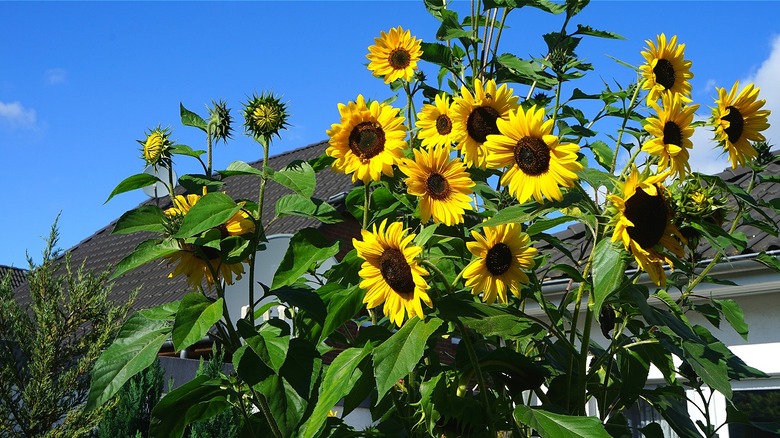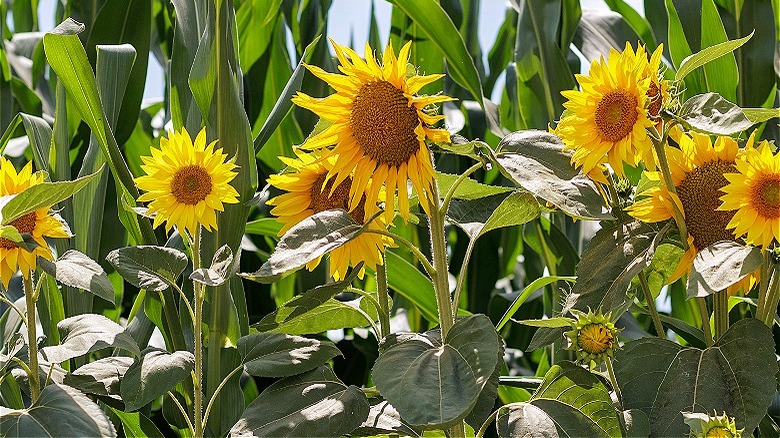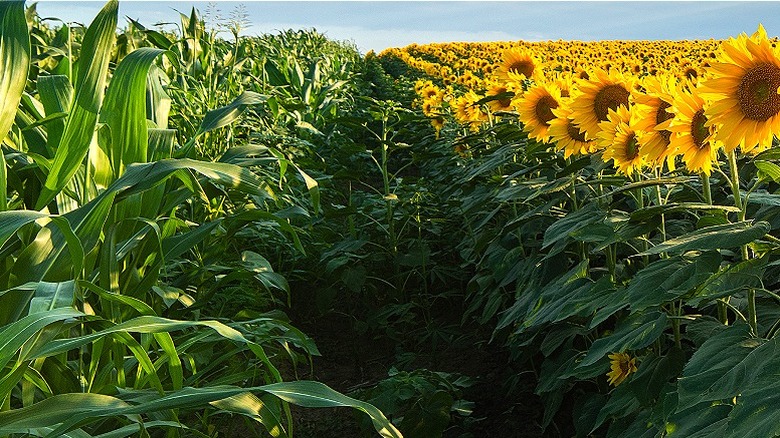The Vibrant Vegetable That's A Great Companion Plant For Sunflowers
Finding the perfect garden companion to grow together with your sunflowers can prove a challenge. The consequences of mismatched companion planting can be disappointing, leading to stunted growth, pest infestations, or simply a less aesthetically pleasing garden. However, if you're stumped, there's one particular pairing that consistently shines for sunflowers: sunflowers and corn. This dynamic duo of herb and vegetable offers a harmonious partnership that not only enhances the visual appeal of your garden but also brings a plethora of practical benefits.
Sunflowers (Helianthus), with their radiant blooms and tall stalks, are known for their ability to brighten up any garden space. However, many gardeners may overlook the impact of companion planting on their sunflowers' overall health and vitality. When the wrong companion plants are placed near sunflowers, problems inevitably arise. While some plants may compete with sunflowers for nutrients or water, pest problems can escalate when incompatible plants attract unwanted visitors or fail to provide a natural pest deterrent. You can avoid such issues, though, by choosing corn (Zea mays) as your sunflowers' garden neighbor.
Physical benefits of the corn and sunflower pairing
Mature sunflower plants and corn are similar in height, as both can reach 5 to 12 feet (depending on the sunflower variety). As it is, sunflowers won't block sunlight from young corn plants as they grow together. Note that both sunflowers and corn need six to eight hours of unfiltered sunlight a day. As for soil conditions, sunflowers and corn are compatible because they have different needs. While sunflowers thrive in well-drained soil, corn requires moisture, especially in its early stages of germination.
But the benefits of this pairing don't stop there. Sunflowers can also act as a windbreak for a corn patch. With their robust stems and large leaves, sunflowers create a buffer against strong winds that might otherwise bend or damage the more delicate corn stalks. This protection is especially valuable in regions prone to gusty weather.
Moreover, the dense canopy of sunflowers provides another significant benefit: weed suppression. The sunflowers' broad leaves create a natural mulch layer that shades the soil underneath, making it less inviting for weeds to take root. Sunflowers also release allelopathic compounds that are useful for natural weed control. As a result, your corn and sunflower patch will require less weeding, saving you time and effort.
Nutritional and pest protection advantages
The synergy between sunflowers and corn extends beyond physical support. The strong, deep roots of sunflowers help to aerate and stabilize soil, thereby reducing erosion and keeping the corn's nutrient-rich environment intact. Companion planting sunflowers and corn also provides pest protection. For one, sunflowers attract ladybugs, which, in turn, prey upon common corn pests, such as aphids and mites. Additionally, sunflowers bring bees that help in the pollination of corn. However, make sure to implement proper spacing between sunflowers and corn plants to harness all these benefits.
Farmers, too, have long recognized the benefits of planting sunflowers with and around corn. You may have noticed sunflowers growing around cornfields (see above), and that's because sunflowers aren't only compatible with corn as far as growing conditions, but they also provide a natural defense. While a perimeter of sunflowers makes corn stalks less accessible to animals like deer, the herb also plays a role in distracting birds. With their tasty seeds, a staple in many birdseed mixes, sunflowers can keep a bird's attention on them, making growing ears of corn a less attractive snack alternative.


